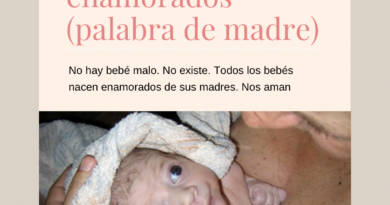Psicología Perinatal
¿Qué es la Psicología Perinatal?
La Psicología Perinatal es un área de la Psicología de la primera infancia. Abarca desde el momento en que la mujer o la pareja deciden qué quieren tener un hijo/a, el período de embarazo, parto, puerperio y los primeros meses del niño/a.
Como mínimo trabaja con esta dupla madre/bebé. Aporta conocimientos y herramientas adecuadas para ayudar a las familias en los diversos procesos de crecimiento en todo lo que rodea (peri) el suceso del nacimiento (natal) de los hijos, poniendo especial énfasis en la calidad de vida del niño y su familia.
La maternidad en el ser humano excede el hecho meramente biológico y tiene un enorme significado a nivel social, cultural y psicológico.
Todo lo que incluye la maternidad, embarazo, parto y puerperio representan una crisis vital y evolutiva que afecta a todo el grupo familiar. Cada mujer atraviesa esta crisis en función de su historia personal, la estructura de su personalidad, su situación actual, las características del bebé y la ubicación de este niño en el encadenamiento histórico de su familia.
La maternidad es una acontecimiento biopsicosocial que provoca un cambio profundo en esa mujer más allá de los cambios visibles.
Está fuera de discusión que la mujer concurra al obstetra para el control del embarazo y que se le aconseje que realice actividad física para preparar su cuerpo, que busque orientación nutricional, etc., sin embargo no es común que se le sugiera que busque acompañamiento psicológico.
La experiencia del nacimiento pude dar lugar a una madre física pero no psicológica, el nacimiento psicológico lleva más tiempo.
Una vez acontecido el nacimiento, la nueva familia concurre al control pediátrico para cuidar la salud del bebé, la mujer concurre al control ginecológico para ver que todo esté bien y el médico le presente variedad de opciones anticonceptivas con el fin de que evalúe como cuidarse. Luego a los 40 días de nacido el bebé, apenas a 40 días de ser madre, ya tiene el alta. Seguramente el resto de la familia, su pareja, ya retome su trabajo y rutinas habituales y ella se encuentra en su puerperio con un bebé al que está conociendo. Y ese bebé va a necesitar de esa persona que tenga la suficiente capacidad de interpretarlo y brindarle contención emocional.
¿Qué sucede entonces si la madre se encuentra emocionalmente ausente? ¿Qué sucede entonces si la madre se encuentra ansiosa, deprimida, angustiada? Con suerte habrá otra persona que pueda ocupar ese lugar y esa función, aunque en muchas situaciones las recientes madres están solas en gran parte del día.
Reconociendo que la salud mental materna es necesaria para el alojamiento de ese bebé y posterior desarrollo nos preguntamos ¿No sería necesario que se normalizara la idea de que una embarazada pueda tener una consulta psicológica para encontrar acompañamiento a este nivel durante el tránsito de su embarazo?.
Es mucho mas común y normal que la mujer embarazada se encuentre perdida, angustiada por situaciones que la rodean y no sabe como resolver, superada con lo que le está pasando y que le cueste muchísimo adaptar su vida al nuevo integrante de la familia, no al revés, en donde la romantización del embarazo y nacimiento hace que esté instalada esta idea de que todo es maravilloso y hermoso y que no hay lugar para que la persona que tuvo un bebé se sienta mal a nivel emocional o psicológico. Al contrario, el saber que existen situaciones que pueden hacerlas sentir mal las ayuda a trabajar en eso y comenzar a sentirse mejor más rápidamente.
¿Cuáles son las áreas de intervención de la Psicología Perinatal?
Preconcepción y Concepción:
. Evaluación psicológica en las dificultades de concepción
. Disminución de la ansiedad y acompañamiento psicológico en los tratamientos de reproducción asistida.
Gestación:
. Reducción de la ansiedad durante el embarazo
. Intervención psicológica en el miedo al parto y otros miedos.
. Prevención de la aparición de problemas emocionales o psicológicos. . Prevención de los efectos físicos del estres durante el embarazo.
Parto y Postparto:
. Apoyo emocional en Baby blues.
. Intervención en depresión postparto.
. Intervención en parto traumático.
. Intervención y reducción de comportamientos recurrentes derivados de la ansiedad. . Acompañamiento psicológico en el duelo perinatal.
. Prevención e intervención en el sufrimiento emocional familiar.
Puerperio:
. Intervención con las dificultades en el vínculo mamá/bebé.
. Reducción a las dificultades de adaptación a la maternidad/paternidad. . Reducción de los problemas en las relaciones de pareja y familiares.
Lic. Alejandra Bossio
Let’s talk about Perinatal Psychology, what is it?
Perinatal Psychology is an area of Early Childhood Psychology. It covers the moment in which the woman or the couple decides that they want to have a child, the period of pregnancy, childbirth, puerperium, and the first months of the child.
At a minimum, it works with this mother/baby duo. It provides knowledge and appropriate tools to help families in the various growth processes in everything that surrounds (peri) the event of the birth (natal) of children, with special emphasis on the quality of life of the child and his family.
Maternity in the human being goes beyond biological fact and has enormous meaning at a social, cultural, and psychological level.
Everything that includes motherhood, pregnancy, childbirth, and the puerperium represents a vital and evolutionary crisis that affects the entire family group. Each woman goes through this crisis based on her personal history, the structure of her personality, her current situation, the characteristics of the baby, and the location of this child in the historical chain of her family.
Motherhood is a biopsychosocial event that causes a deep change in that woman beyond the visible changes.
It’s out of the question for the woman to go to the gynecologist for pregnancy control and to be advised to do physical activity to prepare her body, to seek nutritional guidance, etc., however, it’s not common for her to be suggested to seek psychological support.
The experience of birth can give rise to a physical mother but not a psychological one, psychological birth takes longer.
Once the birth has occurred, the new family attends the pediatric control to take care of the baby’s health, the woman attends the obstetric control to see that everything is fine and the doctor presents her with a variety of contraceptive options to evaluate how to take care of herself. Then 40 days after the baby was born, just 40 days after becoming a mother, she is already discharged. Surely the rest of the family, her partner, is already back to work and usual routines and she is in her postpartum period with a baby she is getting to know. And that baby is going to need that person who has enough capacity to interpret it and provide emotional support.
What happens then if the mother is emotionally absent? What happens then if the mother is anxious, depressed, or distressed? Hopefully, there will be someone else who can fill that place and role, although in many situations new mothers are alone for much of the day.
Recognizing that maternal mental health is necessary for the accommodation of that baby and subsequent development, we ask ourselves, would it not be necessary to normalize the idea that a pregnant woman can have a psychological consultation to find support at this level during the transit of her pregnancy?.
It is much more common and normal for a pregnant woman to be lost, distressed by situations that surround her and do not know how to solve them, overcome with what is happening to her and that it is very difficult for her to adapt to her life to the new member of the family, not to the reverse, where the romanticization of pregnancy and birth makes this idea that everything is beautiful and that there is no place for the person who had a baby to feel bad emotionally or psychologically. On the contrary, knowing that there are situations that can make them feel bad helps them to work on it and start feeling better more quickly.
What are the intervention areas of Perinatal Psychology?
Preconception and Conception:
. Psychological evaluation in conception difficulties
. Reduction of anxiety and psychological support in assisted reproduction treatments.
Gestation:
. Reduced anxiety during pregnancy
. Psychological intervention in fear of childbirth and other fears.
. Prevention of the appearance of emotional or psychological problems. . Prevention of the physical effects of stress during pregnancy.
Childbirth and Postpartum:
. Emotional support in Baby blues.
. Intervention in postpartum depression.
. Intervention in traumatic childbirth.
. Intervention and reduction of recurrent behaviors derived from anxiety. . Psychological accompaniment in perinatal grief.
. Prevention and intervention in family emotional suffering.
Puerperium:
. Intervention with difficulties in the mother/baby bond.
. Reduction to the difficulties of adaptation to maternity/paternity.
. Reduction of problems in couple and family relationships.
Lic. Alejandra Bossio


